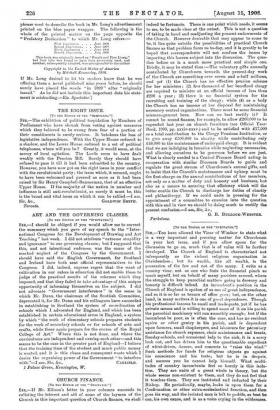CHURCH FINANCE.
[To THE EDITOR OF TEE " SPECTATOR." I Sin,—If Mr. Ellison's letter in your columns succeeds in enlisting the interest and aid of some of the laymen of the Church in this important question of Church finance, we shall indeed be fortunate. There is one point which needs, it seems to me, to be made clear at the outset. This is not a question of taking in hand and readjusting the present endowments of the Church. However desirable that may appear to some to be, it lies quite outside the possibilities of practical Church finance as that problem faces us to-day, and it is greatly to be hoped that correspondents will not confuse the issues by importing this barren subject into the discussion. The ques- tion before us is a much more practical and simple one. Briefly, it may be stated thus :—The voluntary gifts annually contributed by Churchmen towards the present-day work of the Church are something over seven and a-half millions, and yet (1) the Church has no effective pension scheme for her ministers ; (2) five thousand of her beneficed clergy are required to minister at an official income of less than 2200 a year ; (3) there is no financial system for the recruiting and training of the clergy; while (4) as a body the Church has no income at her disposal for maintaining necessary central organisations. There must be some financial mismanagement here. How can we best rectify it? It cannot be sound finance, for example, to allow 2260,000 to be expended last year on church furniture (see Official Year- Book, 1908, pp. xxxiv-xxxv.) and to be satisfied with 217,000 as a total contribution to the Clergy Pensions Institution, or to give away 2500,000 in charity while contributing only 248,000 to the maintenance of underpaid clergy. It is evident that we are indulging in luxuries while neglecting necessaries, and allowing ourselves to be generous before we are just. What is clearly needed is a Central Finance Board acting in co-operation with similar Diocesan Boards to guide and regulate the great stream of Churchmen's annual gifts, and to insist that the Church's maintenance and upkeep must be the first charge on the annual contributions of her members, not only as a matter of duty and honesty and business, but also as a means to securing that efficiency which will the better enable the Church to discharge her duties of charity and philanthropy. If we could unite in pressing for the appointment of a committee to examine into the question with this end in view we should be doing mach to rectify the present confusion.—I am, Sir, &c.,






































 Previous page
Previous page